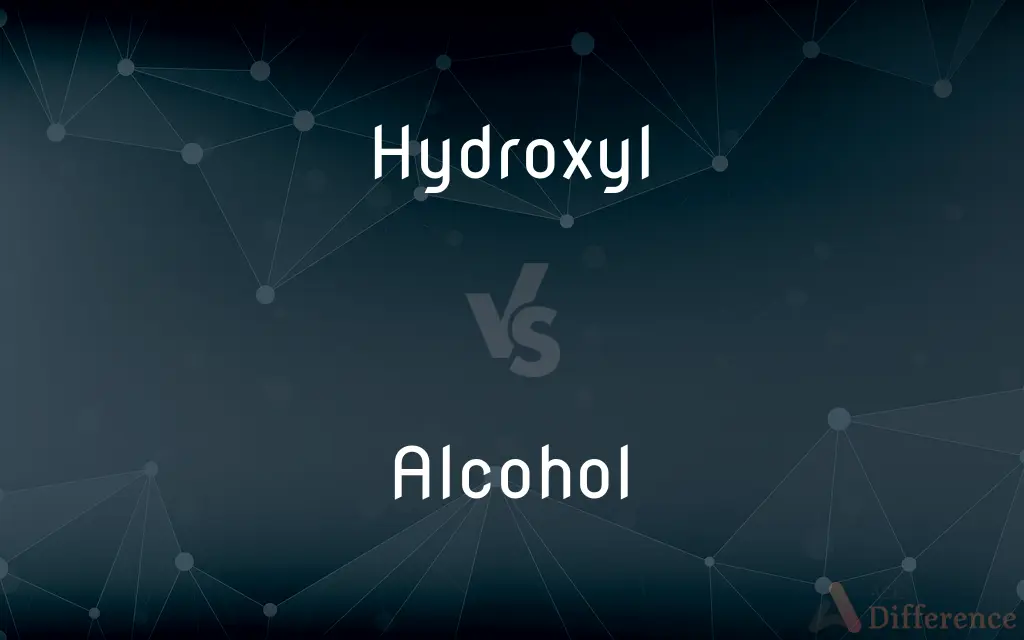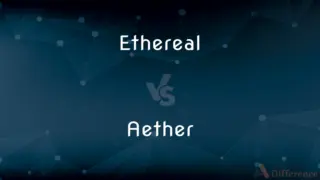Hydroxyl vs. Alcohol — What's the Difference?
Edited by Tayyaba Rehman — By Fiza Rafique — Updated on September 25, 2023
Hydroxyl is a functional group (-OH) found in organic compounds; Alcohol is an organic compound containing one or more hydroxyl groups bound to a carbon atom.

Difference Between Hydroxyl and Alcohol
Table of Contents
ADVERTISEMENT
Key Differences
Hydroxyl represents a functional group that consists of an oxygen atom covalently bonded to a hydrogen atom, represented as -OH. Alcohol, in contrast, is any organic compound in which this hydroxyl functional group is bound to a carbon atom, often referred to as hydroxyl-containing compounds.
The presence of the hydroxyl group in a molecule can lead to specific chemical properties and reactions. Alcohol, on the other hand, derives its characteristic properties, such as solubility in water and reactivity, due to the hydroxyl group present in its structure.
Hydroxyl, being a functional group, can be found in a variety of organic compounds, not just alcohols. Alcohol signifies a broader classification, which includes substances like methanol, ethanol, and isopropanol, all of which contain the hydroxyl group.
When chemists discuss hydroxyl, they are often referring to the reactive nature of this group in organic reactions. In contrast, when referencing alcohol, the conversation usually revolves around specific compounds that have industrial, medicinal, or recreational uses.
While hydroxyl is a foundational concept in organic chemistry, denoting a particular grouping of atoms, alcohol is more commonly discussed in both chemical and everyday contexts due to its varied applications, from solvents to beverages.
ADVERTISEMENT
Comparison Chart
Definition
A functional group (-OH)
An organic compound with one/more hydroxyl groups
Representation
-OH
R-OH (where R is an alkyl group)
Chemical Context
Found in various organic compounds
Specific type of compound with hydroxyls
Examples
Present in alcohols, acids, etc.
Methanol, ethanol, propanol
Usage in Discussion
Chemical structure and reactions
Specific compounds, their properties, and uses
Compare with Definitions
Hydroxyl
The defining group in alcohols and phenols.
Phenols have a hydroxyl group bonded to a benzene ring.
Alcohol
A substance derived from hydrocarbons by replacing one or more hydrogen atoms with a hydroxyl group.
Methanol, an alcohol, is used as an industrial solvent.
Hydroxyl
A functional group consisting of oxygen bonded to hydrogen.
The hydroxyl group in alcohols is responsible for their characteristic properties.
Alcohol
Molecules with a hydroxyl group bonded to a saturated carbon atom.
Butanol is a four-carbon alcohol used in the manufacture of plastics.
Hydroxyl
A group that influences the reactivity of organic compounds.
The presence of a hydroxyl group can make a molecule more polar.
Alcohol
Any compound characterized by the presence of an -OH group attached to a carbon atom.
Isopropyl alcohol is commonly used as a disinfectant.
Hydroxyl
Represents an oxygen and hydrogen atom combination in chemistry.
The reactivity of ethers differs from alcohols due to the absence of a hydroxyl group.
Alcohol
An organic compound containing a hydroxyl functional group.
Ethanol is a type of alcohol found in alcoholic beverages.
Hydroxyl
An -OH group found in organic molecules.
Carboxylic acids contain a hydroxyl group bonded to a carbonyl carbon.
Alcohol
In chemistry, alcohol is an organic compound that carries at least one hydroxyl functional group (−OH) bound to a saturated carbon atom. The term alcohol originally referred to the primary alcohol ethanol (ethyl alcohol), which is used as a drug and is the main alcohol present in alcoholic drinks.
Hydroxyl
The univalent group OH, a characteristic component of bases, certain acids, phenols, alcohols, carboxylic and sulfonic acids, and amphoteric compounds.
Alcohol
A colourless volatile flammable liquid which is produced by the natural fermentation of sugars and is the intoxicating constituent of wine, beer, spirits, and other drinks, and is also used as an industrial solvent and as fuel
The use of petrol containing alcohol
It is an offence to drive if you have more than 80 mg of alcohol per 100 ml of blood
Hydroxyl
(chemistry) A univalent radical or functional group (–OH) in organic chemistry; present in alcohols, phenols, carboxylic acids and certain other classes of compounds.
Alcohol
Any of a series of hydroxyl compounds, the simplest of which are derived from saturated hydrocarbons, have the general formula CnH2n+1OH, and include ethanol and methanol.
Hydroxyl
A compound radical, or unsaturated group, HO, consisting of one atom of hydrogen and one of oxygen. It is a characteristic part of the hydrates, the alcohols, the oxygen acids, etc.
Alcohol
A colorless volatile flammable liquid, C2H5OH, synthesized or obtained by fermentation of sugars and starches and widely used, either pure or denatured, as a solvent and in drugs, cleaning solutions, explosives, and intoxicating beverages. Also called ethanol, ethyl alcohol, grain alcohol.
Hydroxyl
The monovalent group -OH in such compounds as bases and some acids and alcohols
Alcohol
Intoxicating beverages containing ethanol considered as a group
The national consumption of alcohol.
Alcohol
Any of a class of organic compounds (such as ethanol) containing a hydroxyl functional group (-OH).
Alcohol
(colloquial) Ethanol.
Alcohol
(uncountable) Beverages containing ethanol, collectively.
Alcohol
(obsolete) Any very fine powder.
Alcohol
An impalpable powder.
Alcohol
The fluid essence or pure spirit obtained by distillation.
Alcohol
Pure spirit of wine; pure or highly rectified spirit (called also ethyl alcohol or ethanol, CH3.CH2.OH); the spirituous or intoxicating element of fermented or distilled liquors, or more loosely a liquid containing it in considerable quantity. It is extracted by simple distillation from various vegetable juices and infusions of a saccharine nature, which have undergone vinous fermentation.
Alcohol
A class of compounds analogous to vinic alcohol in constitution. Chemically speaking, they are hydroxides of certain organic radicals; as, the radical ethyl forms common or ethyl alcohol (C2H5.OH); methyl forms methyl alcohol (CH3.OH) or wood spirit; amyl forms amyl alcohol (C5H11.OH) or fusel oil, etc.
Alcohol
A liquor or brew containing alcohol as the active agent;
Alcohol (or drink) ruined him
Alcohol
Any of a series of volatile hydroxyl compounds that are made from hydrocarbons by distillation
Alcohol
A class of compounds used in solvents, antiseptics, and beverages.
Denatured alcohol is unfit for consumption due to added chemicals.
Common Curiosities
Is ethanol the same as alcohol?
Ethanol is a type of alcohol, specifically the one found in alcoholic drinks.
What types of compounds are classified as alcohols?
Compounds with one or more hydroxyl groups attached to carbon atoms are classified as alcohols.
Can hydroxyl groups be found in compounds other than alcohols?
Yes, hydroxyl groups can be found in various compounds like acids, sugars, and more.
What role does the hydroxyl group play in organic reactions?
The hydroxyl group can influence reactivity, polarity, and participate in various chemical reactions.
What is the hydroxyl group's chemical formula?
The hydroxyl group's chemical formula is -OH.
Why are hydroxyl groups important in biology?
Hydroxyl groups play key roles in many biological molecules, affecting solubility, reactivity, and molecular interactions.
What gives alcohols their unique properties?
The presence of the hydroxyl group gives alcohols their unique properties.
Which alcohol is commonly used for disinfection?
Isopropyl alcohol is commonly used for disinfection.
Can the hydroxyl group participate in hydrogen bonding?
Yes, the hydroxyl group can participate in hydrogen bonding due to its polar nature.
Are all alcohols safe for consumption?
No, only certain alcohols like ethanol are safe in moderation; others like methanol are toxic.
Is the hydroxyl group found in water?
Yes, water (H2O) has two hydrogen atoms bonded to an oxygen, similar to a hydroxyl but not attached to a carbon.
Is alcohol the same as alcoholic drinks?
Alcoholic drinks contain alcohol (typically ethanol), but the term "alcohol" can refer to any compound with a hydroxyl group attached to a carbon atom.
Are all substances containing hydroxyl groups considered alcohols?
No, only when the hydroxyl group is attached to a carbon atom is the compound considered an alcohol.
What's the primary alcohol in hand sanitizers?
The primary alcohols in hand sanitizers are either ethanol or isopropyl alcohol.
Which alcohol is found in beverages like beer and wine?
Ethanol is the alcohol found in beverages like beer and wine.
Share Your Discovery

Previous Comparison
Ethereal vs. Aether
Next Comparison
Twist vs. TurnAuthor Spotlight
Written by
Fiza RafiqueFiza Rafique is a skilled content writer at AskDifference.com, where she meticulously refines and enhances written pieces. Drawing from her vast editorial expertise, Fiza ensures clarity, accuracy, and precision in every article. Passionate about language, she continually seeks to elevate the quality of content for readers worldwide.
Edited by
Tayyaba RehmanTayyaba Rehman is a distinguished writer, currently serving as a primary contributor to askdifference.com. As a researcher in semantics and etymology, Tayyaba's passion for the complexity of languages and their distinctions has found a perfect home on the platform. Tayyaba delves into the intricacies of language, distinguishing between commonly confused words and phrases, thereby providing clarity for readers worldwide.














































